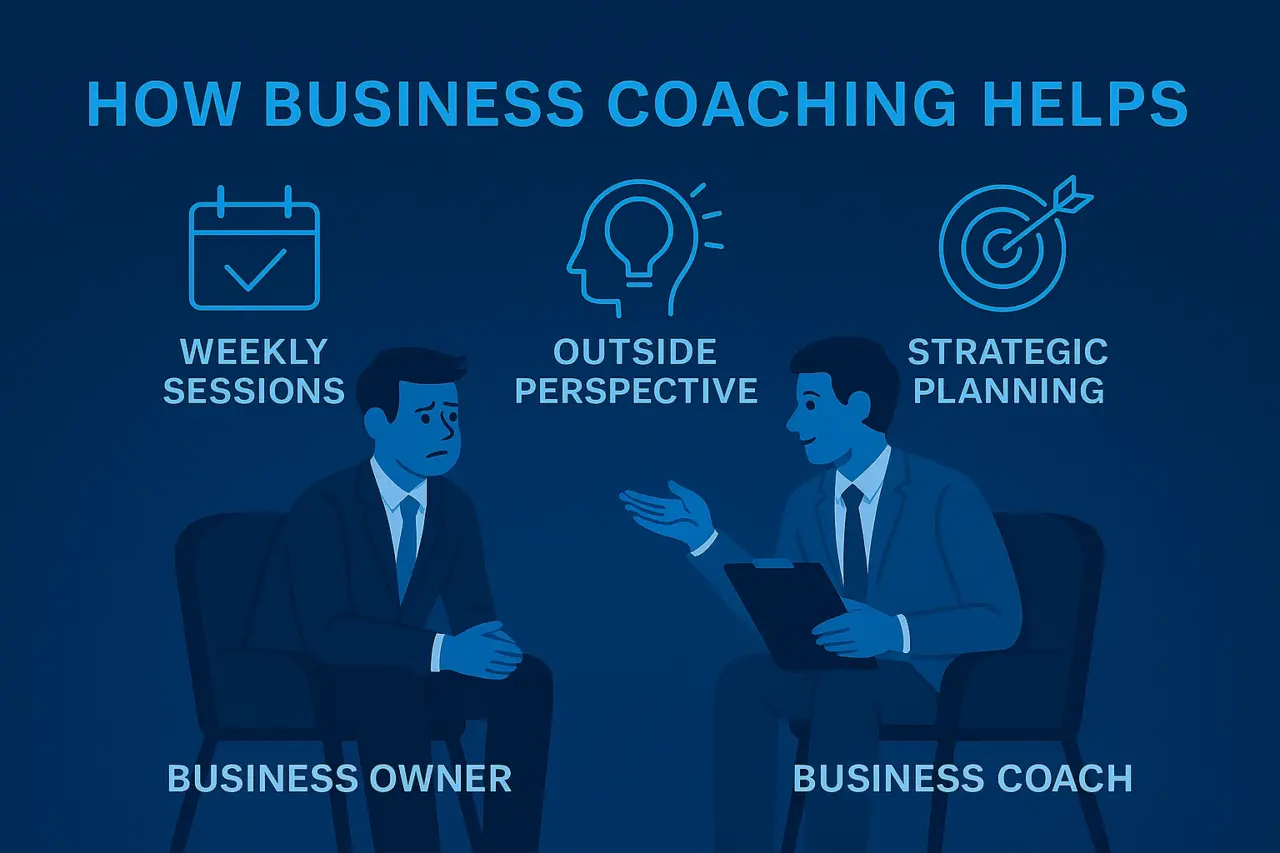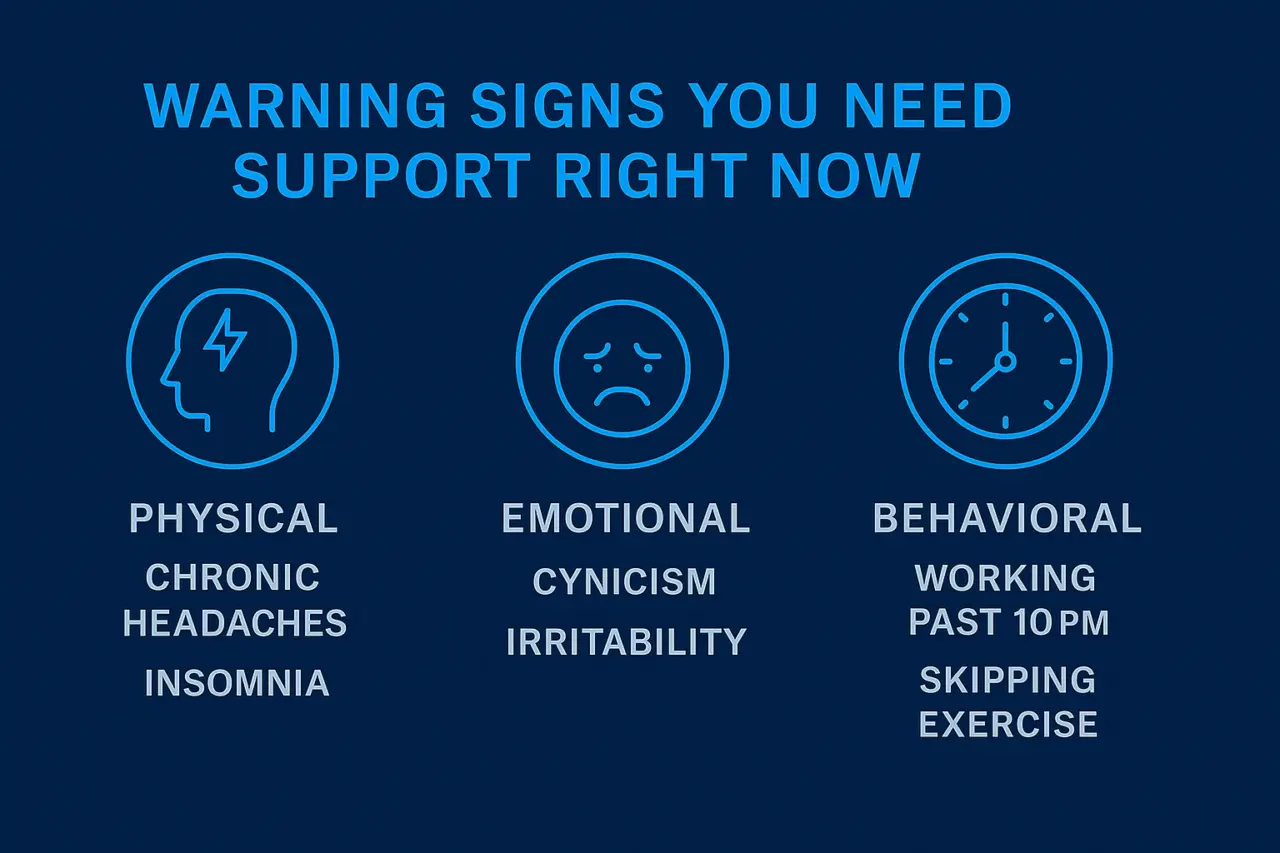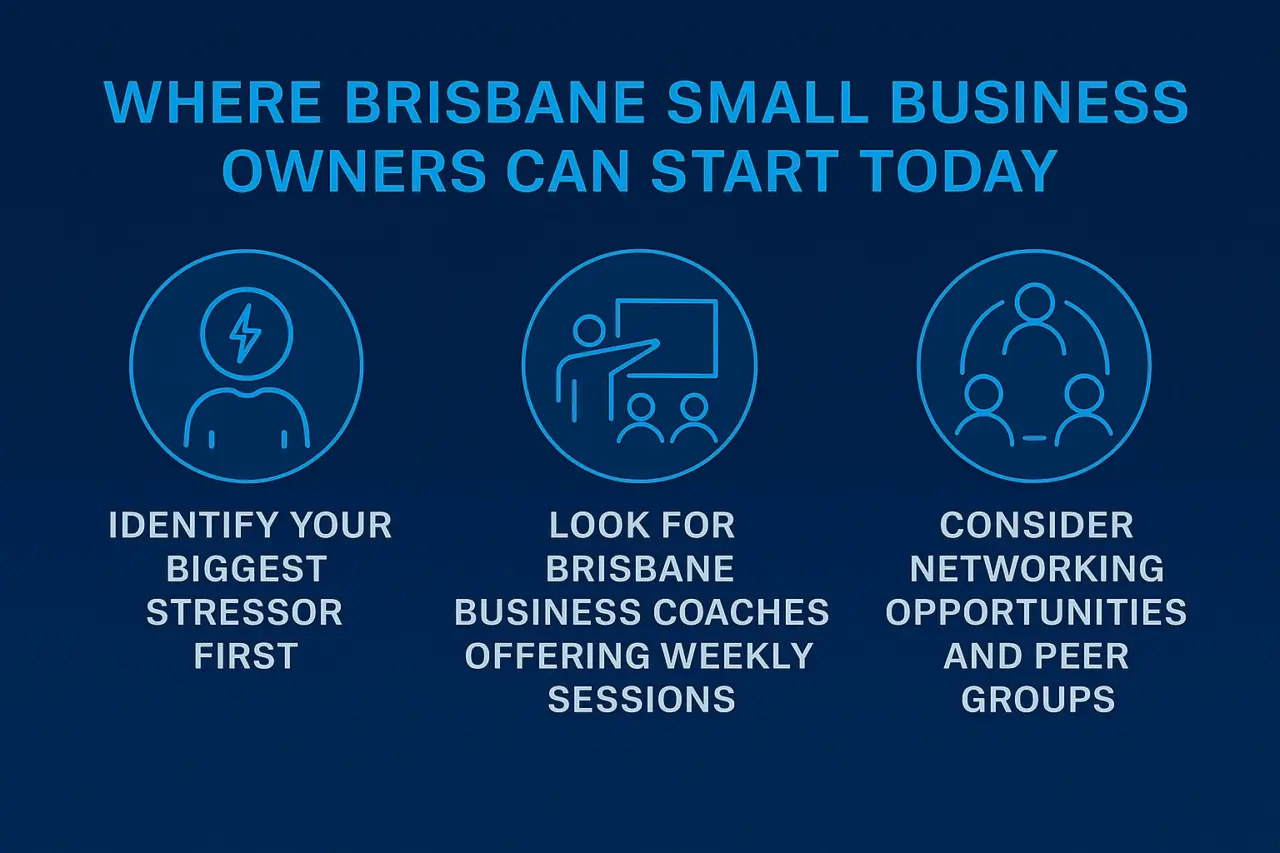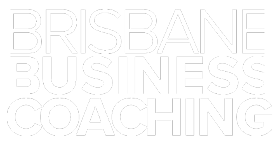Brisbane business owners hit the same wall over and over. You've got a solid product or service, but growth rarely comes easy. Revenue stays flat, staff issues keep coming up, systems that worked last year don't work now.
It almost feels like the harder you work, the less progress you actually make.
When you feel stuck in the same place, coaching can get you out of that endless abyss. And the way out is not generic advice you could find in any business book. Real coaching looks at what's happening in your company right now and builds solutions around that.
Small business owners in Brisbane have access to programs, grants, and resources most don't even know exist. The stories ahead show what happens when you tap into the right support. Let's look at how two different businesses used coaching to create genuine Brisbane business success.
Even the most capable teams can fall apart without the right structure. This Fortitude Valley consulting firm had smart, motivated people, but behind the scenes, things were coming undone.

The 12-person team at this business advisory company was stuck in constant survival mode. Every day brought another urgent task, another missed handover, another late-night fix. With no clear systems or processes, burnout spread like wildfire.
And yes, we've all seen that "too busy to plan" excuse before. This firm lived it every single day. The business leaders knew something had to change, but didn't know where to start.
After looking closely at all of their systems, the coaching found out the root cause of the firm's struggles. It turned out, the real problem was that the firm needed a structure to support the team properly. Here's what they built:
It wasn’t glamorous work, but it paid off. Research shows that companies with strong organisational systems see significantly better employee retention and performance. This consulting business proved that the pattern holds after only three months of implementation.
The change was as good as Shakespeare’s plot twists! Staff retention improved by around 90% within a year. The team went from firefighting the wildfire to forward planning. Employees stopped thinking about leaving and started contributing ideas for growth.
What’s more is that the business developed new products and services to target different market segments across Brisbane's CBD and inner suburbs. As a butterfly effect, their revenue grew by 40% as operations became smoother.
Another story is about this Paddington restaurant that had no shortage of diners. But behind the full tables and glowing reviews, the owner was exhausted. The staff kept quitting, and profits were slipping through the cracks faster than the cash came in.
The venue stayed busy most nights, but the financial situation was drying up like the Sahara. Food waste was sky-high, and menu prices didn’t match costs. There were no proper systems to train new staff, so they kept leaving.
You might be wondering how a packed restaurant could be struggling. The answer came down to margins. Menu items were priced wrong, waste was out of control, and employees kept leaving because training didn't exist (yes, exactly what happened in The Bear).
Their coaching focused on the numbers first. The owner needed to understand actual costs before making any other changes. Here's what the business implemented:
It took six months of consistent work, but the transformation stuck. Their data showed customers valued quality over cheapness.
Profit margins improved from 8% to 22% within one year. That shift changed everything. Staff turnover dropped by 60% because employees received proper training and support. The team could focus on what they loved, creating great food instead of putting out fires.
Now, with solid systems and confidence in the numbers, the owner is planning a second location.
It’s proof that in hospitality businesses, being busy isn’t the same as being profitable. Once the owner stopped running on autopilot and started managing strategically, everything changed for the better.
None of these wins happened overnight, and none of them happened by accident. So what's the real deal here? Every owner made a choice to step back, get help, and do things differently.
They stopped trying to fix everything alone. That first step back changed everything. Pride keeps so many small business owners stuck longer than they realise.
No matter what, the numbers don't lie, folks. Each company developed a clear business plan with specific milestones. Vague goals like "grow the business" got replaced with concrete targets. Data and research drove informed decisions instead of guesswork.
Here's what worked across both businesses:
Growth doesn't happen by accident. These habits might sound simple, but together they make a powerful difference. Once these business owners committed to structure, consistency, and coaching, progress started to grow like Jack’s beanstalk.
All these entrepreneurs chose to invest in coaching before the crisis hit. They saw the warning signs and acted.
Always remember: Waiting until everything falls apart costs far more money and energy than getting help early.
Running a small business can feel like you’re doing everything by yourself. But in Brisbane, you’re never alone! It is one of Australia’s most supportive ecosystems for entrepreneurs, offering real tools, funding, and community to help local businesses grow.

So you have zero excuses to sit stuck! Here are some helpful guidelines for you to start being part of the business network.
The Brisbane Economic Development Agency provides expansion support for small businesses ready to grow. Lord Mayor Adrian Schrinner champions programs that help enterprises succeed at every stage.
One standout example is the Lord Mayor’s Business Awards. For many winners, the recognition opens doors to investors, partnerships, and media opportunities that transform their trajectory.
There’s also the Brisbane City Council that operates a 24/7 Business Hotline for immediate contact and support.
The Brisbane Business Hub offers free workshops where entrepreneurs can develop skills and create strategies. You can utilise these programs to connect local business leaders with the tools and insights they need.
You’ll also find valuable data through the Brisbane Community Profile. It’ll help you understand your target customers and market trends before making big decisions.
And if you’re ready to expand beyond the local market, the Brisbane Economic Development Agency connects businesses to world markets through export programs. That can support your business with grants, trade shows, and global promotion opportunities.
Many successful business owners in Brisbane say the same thing: they didn’t grow alone. The city’s support programs, community hubs, and local mentors helped them find focus, accountability, and opportunity.
They could achieve success because Brisbane’s small business ecosystem is a collection of resources and a network built on collaboration.
If your business reaches a point where hard work doesn’t feel enough anymore, then yes, that’s usually the moment when coaching makes sense.
Check out this potentially relatable list! If any of these sound familiar, it might be time to bring in an outside perspective.

If you saw yourself in even three of the notes above, consider this guide to be your sign to get help. Business coaching can help you work smarter instead of just harder.
Keep in mind that the best time to seek coaching isn’t when things are falling apart. It’s before that happens. Too many business owners wait until the stress hits a breaking point. If you get support early, it would let you spend less money, avoid costly mistakes, and steer clear of burnout.
What It Really Takes: Remember that coaching only works when you’re ready to show up and do the work. The most successful clients aren’t just curious, they’re committed. They take the insights from each session and turn them into action.
So you’ve seen what’s possible. Real Brisbane businesses with improving revenue, culture, and operations with the right guidance. Now, it’s your turn to decide what comes next.
The truth is, no one builds lasting success alone. The business owners in these stories didn’t have all the answers. They simply reached out for help, took action, and committed to change. That’s where real growth begins.
Coaching isn’t an expense. It is an investment that pays off in confidence, clarity, and measurable progress.
So, start exploring what’s out there. Talk to a local coach. Attend a Brisbane Business Hub workshop. Connect with other entrepreneurs who’ve been where you are now.
Your next chapter could start today. One decision, one conversation, one small step at a time. Because growth doesn’t happen by luck. It happens when you decide to build with support.
It's 10:30 pm on a Tuesday. You're still answering emails, worrying about tomorrow's payroll, and wondering if that supplier ever got back to you. Your family's been asleep for hours, and you can't remember the last time you felt properly rested.
If this sounds like you, you're not the only one drowning. Nearly half of Australian small business owners experienced burnout in the past year. Small business stress affects your work and personal life in ways most employees never experience.
Don’t worry, you don't have to figure this out alone. There are practical ways to shift from constant overwhelm to sustainable success.
In this article, we'll cover why business owners burn out differently and how coaching helps manage stress. You'll learn the warning signs to watch for and where Brisbane small business owners can start today.
Small business stress affects owners differently because they carry sole responsibility without the support systems employees have.

Yes, business owners face unique isolation. Employees have managers checking in, but who looks after the boss? You might feel like every decision lands on your desk while everyone else clocks off at 5 pm.
The financial side makes this worse. Loan payments arrive whether you had a good month or not. Then, cash flow anxiety keeps you awake at night, and the responsibility for employees' livelihoods creates constant worry that weighs on your mind.
This pressure leads many owners to hold onto everything. You tell yourself, "If I don't do it myself, it won't be right." That belief keeps you stuck doing operational tasks instead of leading the business forward.
We know a Brisbane cafe owner who spent three years making every coffee herself because she didn't trust her staff. She burnt out before turning 40 and nearly lost everything she'd built. Terrible story, isn’t it?
The best part about working with a business coach is having someone who checks on you weekly, including your mental health and well-being.

Here are three ways coaching directly addresses the stress that small business owners face.
Weekly coaching sessions break isolation and give you consistent support. You finally have someone who checks on your mental health regularly, alongside your business performance. What’s more, the regular contact stops stress from building unnoticed over weeks or months.
We have seen that most business owners go months without anyone asking how they're coping. A coach fills that gap and creates a safe space where you can admit when things feel overwhelming.
A coach helps identify what to delegate, drop, or focus on first. When you're drowning in tasks, you can't see which ones deserve your attention.
This clarity reduces the decision fatigue that drains business owners every single day. Research published in the Journal of Medical Internet Research found that one-on-one coaching improved positive mental health in as short as three months, with continued benefits over longer periods.
If you're struggling with which roles to delegate or outsource, this complete guide on staff recruitment walks through the process step by step.
Strategic planning reduces daily anxiety because clear goals and action plans make work feel purposeful. After hiring my first business coach in 2011, I spent $40k over 18 months. Every session added value because we created systems that freed up my time and reduced the constant firefighting.
The coaching process also builds leadership skills that last. You learn to ask better questions of yourself and your team, which creates lasting change beyond the coaching relationship.
How do you know when normal business pressure has crossed into burnout territory? Watch for physical symptoms like chronic headaches and insomnia, emotional changes such as cynicism and irritability, and behavioural shifts like working past 10 pm regularly and skipping exercise.

These warning signs typically appear in three distinct areas of your life.
Your body often sends signals before your mind catches up. Those chronic headaches become so normal that you stop mentioning them to anyone. Stomach issues flare up without an obvious cause, and you might shrug them off as "just stress."
Insomnia keeps you staring at the ceiling at 3 am, replaying tomorrow's problems. The constant fatigue lingers no matter how much rest you manage to squeeze in on weekends.
The emotional shifts can be harder to spot because they happen gradually. You snap at your team over small mistakes that never bothered you six months ago. The business you once loved building now feels like a burden you're carrying alone.
Feeling like you're achieving less than expected becomes your internal soundtrack, even when you're putting in longer hours than ever before.
This is where the damage becomes visible to people around you. Disconnecting after hours feels impossible because your mind won't stop running through problems. Working past 10 pm shifts from occasional necessity to your new normal routine.
Meals get skipped because meetings run over. Exercise routines disappear because "there's just no time" between everything else demanding your attention.
According to research from SafeWork Australia, untreated workplace stress can lead to serious health conditions, including cardiovascular disease and type 2 diabetes. The warning signs deserve your attention before they escalate into bigger problems.
If you find yourself ticking multiple boxes from this list, the time to act is now. Waiting until you completely burn out makes recovery much harder than addressing these warning signs early.
We recommend starting with one change that addresses your biggest pain point. The path forward becomes clearer when you break it down into manageable steps that fit your current situation.

Here are three practical starting points you can act on this week.
Don't try fixing everything at once because that just adds more pressure to an already full plate. The most effective approach focuses on the one issue draining you most right now.
Ask yourself what keeps you awake at night. Is it the financial anxiety about next month's expenses? The team management issues are eating up hours you don't have? The marketing that never seems to deliver results?
Pick one area and tackle that first, then move to the next challenge once you've made progress.
Monthly check-ins sound convenient, but they don't work for managing stress effectively. The gap between sessions allows problems to build and compound without anyone noticing the warning signs until things reach a crisis point.
Weekly coaching creates a consistent rhythm that keeps both mental health and business priorities visible. Most effective coaching relationships in Brisbane follow this weekly pattern because it builds accountability that monthly sessions simply can't match. You need someone checking in regularly while issues are still small and manageable.
Connecting with other small business owners who face similar challenges changes everything. The isolation lifts when you realise other Brisbane SME owners struggle with the same staff retention issues, cash flow pressures, and work-life balance problems you're facing.
These connections often surface practical solutions you hadn't considered. Plus, having a safe space to admit when things feel overwhelming removes the burden of pretending you've got it all sorted. Look for local business groups, industry associations, or coaching programmes that include peer support alongside one-on-one sessions.
If you're considering business coaching or wondering whether your stress levels are normal, you're not alone. These are the questions Brisbane small business owners ask most often when they're exploring support options.
Here are simple answers to help you make informed decisions.
Yes, owning a small business is inherently stressful. You're responsible for revenue, employees' livelihoods, customer satisfaction, and countless daily decisions. Unlike employees who can clock off and leave work behind, business owners carry the weight of their company's success constantly. The stress becomes problematic when it affects your health, relationships, or ability to make sound decisions.
The 5 C's are: Control (identifying what you can change), Commitment (staying dedicated to solutions), Challenge (viewing stress as growth opportunities), Connection (maintaining supportive relationships), and Confidence (believing in your ability to cope). These principles help you build resilience and manage workplace stress more effectively over time.
Small businesses face multiple pressures, including rising operational costs, staffing shortages, changing customer expectations, and economic uncertainty. Cash flow remains tight while expenses climb. Many owners also struggle with the transition to digital marketing and e-commerce, plus the mental load of wearing every hat in the company without proper support systems.
The 4 A's are: Avoid (eliminate unnecessary stressors), Alter (change how you handle situations), Accept (acknowledge what you can't control), and Adapt (adjust your expectations and responses). These strategies give you a framework for tackling different types of stress in your business and personal life.
The 5 C's of coaching focus on: Clarity (defining clear goals), Capability (building skills and confidence), Confidence (strengthening self-belief), Connection (improving relationships), and Contribution (finding purpose and meaning). Effective business coaches guide you through developing each of these areas to create lasting change in how you lead and manage.
The 7 P's include: Purpose (defining your why), Perspective (seeing situations differently), Priorities (focusing on what matters), Planning (creating actionable steps), Practice (implementing changes), Progress (measuring results), and Persistence (staying committed). These principles create a structured approach to achieving your business and personal goals through coaching.
The 5 R's are: Reflect (examining current situations), Reframe (shifting perspectives on challenges), Respond (choosing better reactions), Restructure (changing systems and habits), and Review (assessing what's working). This cycle helps you move from reactive firefighting to proactive leadership in your business.
The 70 30 rule means the client does 70% of the talking while the coach does 30%. Good coaches ask questions rather than giving direct advice. This approach helps you develop your own solutions and insights, which creates stronger commitment and better results than simply following someone else's instructions. You own the answers, making change more sustainable.
Managing small business stress comes down to one thing: getting the right support before burnout takes over. Waiting until things get worse only makes recovery harder.
Successful Brisbane business owners work with coaches and build strong support networks. They recognise that investing in their mental health and wellbeing is what keeps their businesses running strong.
Start by naming your biggest pain point today. Then explore business coaching options or peer connections in your area. Your business needs you to be healthy and focused, instead of exhausted and overwhelmed.
Business coaching gives women entrepreneurs in Brisbane the tools to overcome obstacles and build real momentum. Many of these founders still experience slower growth than their male peers due to funding gaps and an uneven work-life balance.
Here at Brisbane Business Coaching, we understand the challenges women in business deal with every day. We’re here to offer practical guidance that helps you move forward.
In this article, we’ll look at why the right support is essential for women in business and how coaching can help them achieve progress. We’ll also discuss what it takes to move past that sense of feeling stuck.
Read on to learn how small, consistent actions can reignite your sense of momentum.
Support changes everything because female founders often deal with a completely different set of expectations and obstacles than men do. The playing field isn't always level, and that's just the reality.

It’s time to take a look at how these challenges show up in the day-to-day lives of women founders.
Women entrepreneurs in Brisbane face some unique local barriers that can feel pretty frustrating.
For starters, the city's business networks can sometimes feel like old boys' clubs. Like, when you're trying to secure funding, investors may ask different questions or hold you to different standards than they would for male founders (honestly, it’s frustrating when effort isn’t the issue).
Then there’s the local market itself. Some industries still carry outdated assumptions about who “should” be running things. Those perceptions can make it harder for women to be taken seriously or to build the professional credibility they’ve already earned.
Now, here's where things get even trickier for female business owners. While society debates fairness, women business owners are living the reality every single day.
For example, you're expected to do great professionally while also managing way more at home than your male peers typically do. Think about school pickups, household duties, and taking care of ageing parents. Seriously, the mental load adds up fast.
That’s why many talented female founders hit a wall long before they reach their full potential without proper guidance. It’s truly sad when you think about it.
Pro tip: Invest in your leadership skills. The more confident you feel in your abilities, the easier it becomes to lead with purpose.
Coaching for women gives you a structured and accountable partnership that goes way beyond simple advice. Specifically, you're building real skills and actionable strategies that fit your specific situation.

So what actually happens in these coaching engagements? Let's look at the details.
A coaching session is a confidential meeting where you focus entirely on your business goals. Some sessions take place one-on-one, while others bring together a small group of women founders who share insights and experiences.
Either way, the purpose stays the same: identify problems, brainstorm solutions, and set tasks you can actually complete.
Here's what typically happens in these sessions:
The effort pays off when you finally feel in control.
Now that you have a sense of what coaching sessions involve, it’s time to look at coaching programmes and the extra depth they offer. These programmes deliver ongoing, structured support for women business owners across Queensland.
A solid coaching programme typically includes:
As the weeks go by, you’ll notice how much smoother everything feels once you’ve got the right structure and backing in place.
Useful tip: Check out the Business Queensland Women in Business program. It presents state-backed support and practical resources for women who are looking to expand their networks and strengthen their business foundations.
Do you ever feel like you’re working harder than ever but still going in circles? Many entrepreneurs hit that point of frustration. You know something has to change, but you are unsure where to start. This is where a good coach helps clear the fog and brings your focus back.

We’ll now explain how targeted guidance helps you rebuild confidence and take control of your next steps.
Good business support gives women business owners a new way to see what’s really happening. Particularly, when you’re caught up in the day-to-day, it’s easy to miss the bigger picture. A mentor helps you step back, identify what’s off track, and figure out how to fix it.
Coaches also help you validate decisions you've been afraid to make and reframe challenges so you can see new options. For example, what feels like a staffing crisis might actually be a systems problem (sometimes, perspective is all we need).
Once you see the real issue, you can deal with it the right way. That kind of clarity gives you the confidence to make decisions and lead with a steady hand.
Pro tip: Keep an open mind during coaching sessions. The feedback that feels uncomfortable is usually the most valuable.
What happens when your business starts to feel messy and confusing? Coaching helps you clear things up and see what helps you move forward. In each session, you sort through challenges and gain more clarity on your situation.
More importantly, expert mentors don’t back away from asking the hard questions that force you to prioritise properly. This way, you stop wasting energy on distractions and focus on what grows your business.
Business coaching improves your company’s stability and long-term growth. For women entrepreneurs in Brisbane, coaching support helps you handle unique local challenges like funding access, network limitations, and work-life pressures.
In this blog, we've looked at why support is so important for female founders, plus how coaching helps improve your business. We’ve also talked about what it takes to move past feeling stuck.
Ready to find the support you need? Browse the coaches listed on our website to find the right partner for your goals.
Have you thought about stepping away from your business, but don't know where to start? We’ve met plenty of business owners who don't have a proper succession plan, yet around half of them want to exit within the next five years.
Now, if you don’t plan your exit properly, things can get messy. Families argue, the business loses value, and your hard work can quickly fade away. That's why we've put this guide together to show you how to prepare for succession, pick the right exit, and get the right support.
Let’s begin with business succession planning.

A business succession plan is your roadmap for handing over ownership when you decide to step back. It maps out who takes over, how the handover happens, and what your exit looks like.
Let's walk through what this means for you.
Deciding on a replacement is your first step, but succession planning goes much further. You’ll need to figure out how to transfer your business assets, work out what the company is worth, and create a realistic timeline.
The process also includes protecting everything you've worked so hard to build. Plenty of owners assume it only applies when family members take over, but you actually have way more exit options than that.
Life has a habit of throwing surprises your way like unexpected illnesses, major relationship changes, or sudden market shifts can push you to act before you're prepared.
But most owners wait until they feel completely ready, but in reality, that moment doesn’t really exist. We’ve seen how fast circumstances can change, and preparation also often takes longer than people anticipate.
Bringing family into the mix can make succession even more complicated. Because what seems fair to one person might feel unfair to another.
And without honest conversations early on, these tensions can hurt both your business and your personal relationships down the track. So, let's get into the actual steps you need to take.

Creating a succession plan can feel like a massive task when you first think about it. But we’ll show you how to create your exit strategy one step at a time to keep it manageable.
Your timeline affects every other choice you'll make in your exit plan. But if you know your target date, you can work backwards and prepare everything that needs to be done.
Here's what needs to happen at each point along the way:
Whatever succession plan you pick, don’t speed through it or set a one-year timeline. Trust us, these five years will be gone before you know it.
Choosing who gets the business is probably the biggest decision you'll face. Each option comes with different benefits and challenges, so think carefully about what fits your situation.
Your main choices include:
Think about what’s most important to you in terms of legacy, control, and financial return. Your choice here will decide how you prepare over the coming years.
Getting someone ready to take over the business isn’t easy since they need both technical and leadership skills. This is when you follow your timeline and start mentoring your successor at least two years before the handover.
You can also hire coaches to share the work and support them in managing the stress of running the business.
A business that can operate without your daily involvement is often worth more and easier to transfer. For that, the most important thing is to document every system and process so new people can follow them without constant questions.
You can also get a valuation to know your business’s worth, and save on taxes and legal costs.
Walking away from your business is a massive life change, even when you're the one choosing to go. Have you thought about how you’ll spend your days without managing people and handling problems?
You need to put thought and planning into finding new sources of purpose and meaning too. If you prepare yourself mentally, the emotional side of letting go can feel more like gaining freedom.

Your exit strategy needs to match both your financial goals and what you want for your future. Let's explore the options available and how to choose wisely.
You've got several paths when it comes to leaving your business. But the right choice for you will ultimately depend on your financial needs, timeline, and what you want to happen to the business.
Each option gives you different money outcomes and asks different things of your time. But try not to lock yourself into one idea too early, as we’re very familiar with plans and priorities shifting as things develop.
Many business owners make avoidable mistakes during their exit because they rush to leave or ignore warning signs. We don’t want you to be one of them, so remember to avoid:
Avoiding these mistakes won’t guarantee you a perfect exit, but it definitely improves your chances.
Waiting too long is the most common mistake business owners make in succession planning. But now you know better.
It doesn't matter if retirement is years away, you're considering selling soon, or you just want a backup plan for unexpected situations. The conversation needs to start today.
Sit down with your family and talk honestly about what everyone expects. When the timing's right, bring your team into the loop too. Most importantly, find a Brisbane coaching professional who gets how local businesses work and can walk you through each step.
Ready to take charge of what happens next? Head to Brisbane Business Coaching and start building your succession plan with someone who understands Queensland businesses.
Losing good staff costs small business owners more than just recruitment fees. Every time someone walks out the door, you're losing their knowledge, their relationships with customers, and the time you invested in training them. The disruption hits your team hard too, as they're left to pick up the slack while you scramble to fill the gap.
But wait, there’s a positive side to explore to overcome these devastating incidents. Through better leadership, stronger workplace culture, and genuine development opportunities, you can build a team that wants to stick around. Yes, you read it right.
This article covers the real reasons people leave, how coaching strengthens your leadership approach, and the specific strategies that help Brisbane small businesses hold onto their best employees.
Ready to strengthen your staff retention? Let's begin.
Letting go of an employee means spending weeks recruiting and interviewing, then months getting someone up to speed. During that time, your other team members are covering extra shifts and fielding questions from the new hire.
Sadly, that productivity gap costs you money every single day.
Beyond that, you're losing workplace knowledge, customer relationships, and the efficiency someone developed over months or years. Your remaining staff also watch people leave, and it affects how they feel about staying.
Eventually, when you only have 10 or 15 people on the team, losing one creates a hole everyone notices. The question becomes: what can you do about it?
Leadership coaching builds the skills that create workplaces people don't want to leave. Simple as it sounds.

It starts with self-awareness. When business owners and managers examine their own behaviour, they start noticing patterns they missed before. Maybe their communication style shuts people down, or their decisions leave the team feeling excluded.
Executive coaching works particularly well for managing directors who need to shift their entire approach. Drawing from our experience with Brisbane organisations, we've seen business owners realise they were creating the very problems they complained about.
One was micromanaging talented staff who just needed space to do their jobs. Another wasn't giving any direction at all, leaving people confused about priorities.
Your front-line managers need support, too. Since they’re the ones having daily conversations with your team, handling conflicts, and setting the tone for each workday.
Mentoring programs give these managers the confidence and skills they need to lead well. And when they feel supported, that feeling flows down to everyone else on the team.
Now, how do you implement these practices? It all starts with your work culture.
The environment you create has a direct impact on whether staff choose to stay or start browsing job ads. Let's look at what makes workplaces feel worth staying in.

Your team wants to know where they stand. That means creating space for genuine feedback so they feel heard instead of sidelined.
While employee surveys help gather input, they only work if you actually act on what you learn. This is why regular conversations beat annual reviews. But the reality is, problems don't wait twelve months to surface, so addressing them early keeps everyone on the same page.
Think about how your team treats each other when pressure builds. In a supportive environment, they back each other up instead of competing for credit or avoiding blame. Social events can help build that connection, though only when they feel natural rather than forced.
Recognition plays into this, too. We're not talking about plaques that collect dust, but genuine acknowledgment when someone does good work. And believe it or not, these small moments add up over time.
Life doesn't happen between 9 and 5, and your staff know it better than anyone. Flexible work arrangements show you trust your team to deliver without micromanaging their hours.
Some need early starts for school drop-offs. Others hit their stride later in the day. Seems like not even a single day is planned to run as planned. When you respect that work-life balance, your staff notice and stick around longer because of it.
Good staff need room to grow, not just a steady paycheque. When people feel stuck in their current role with nowhere to go, they start looking for other opportunities.
We recommend providing training opportunities (yes, this includes the long-term employees) to show your team you're invested in their future. And sometimes it's as simple as letting someone shadow a senior team member or tackle a project that stretches their skills.
Building clear career paths makes a difference here, too. Your employees want to know what comes next. Maybe they won't all become managers, but they should understand how they can progress and what skills they need to develop along the way. This is where business coaching helps small business owners create development plans even when resources feel tight.
Mentoring programs also support this growth without breaking your budget. Pairing experienced staff with newer team members builds skills across your organisation while giving senior people purpose beyond daily tasks.
One-third of employees cite burnout as a reason for leaving. That figure represents people in your business who might be struggling right now.

Here's what makes a difference:
Ultimately, when you create a supportive environment around these issues, your team feels valued rather than expendable. Since we've covered what keeps people, let's look at how to put it together.
Don't worry, you won't need to overhaul everything overnight to build a retention strategy. This section breaks down this approach, so you can adapt easily.
Start with your review process to spot patterns. Do this by asking yourself: Are staff leaving after their first year, or are experienced team members walking out? Those patterns tell you where to focus your efforts first.
Once you know the problems, address them directly. Maybe your workplace culture needs work, or perhaps people aren't seeing clear paths forward.
If you need an extra hand, certified business coaching helps organisations like yours build plans that fit their resources. Through our investigation working with small businesses, we've noticed how generic approaches fail to deliver results.
Coaching programs equip your leaders to create real changes. What does this mean in particular, though? Well, we’re talking about making these strategies part of how your business operates, not just adding policies in a handbook.
All these strategies work better when you have support to implement them. Which is why, our coaching programs focus on developing the leadership skills that drive retention. This means helping business owners and managers build self-awareness, strengthen communication, and create workplaces where people want to stay.
Aside from that, our executive coaching supports managing directors who need to shift how they lead. That’s where leadership development programs extend that support across your organisation.
The bottom line: when your leadership team improves together, the benefits flow through to every employee.
Staff retention comes down to creating a workplace people don't want to leave.
We've covered the real costs of turnover, how leadership coaching builds better managers, the importance of workplace culture and communication, career development paths, mental health support, and practical strategies to tie it all together.
When you invest in strengthening your leadership approach, your employees respond by staying longer. Plus, you don't have to figure this out alone either.
Visit brisbanebusinesscoaching.com.au to explore how our coaching services can help your business build stronger teams, reduce turnover, and achieve long-term success in Brisbane's competitive market.
If you’re running a trade business in Brisbane, that means you're brilliant with the tools! You can wire a house, build a deck, or fix a blocked drain with your eyes closed. But here's something nobody tells you: being great at your trade doesn't automatically make you great at running a business.
The numbers don’t lie, and most trade businesses plateau within three years. Staff leave when you need them most, your quotes are all over the place, you're working 70-hour weeks, but you're wondering where the money went.
That's where trade business coaching programs comes in. Real systems for quoting jobs, keeping clients happy, and making actual profit. The kind of coach support that helps business owners move from constant firefighting to sustainable growth with less stress.
So, let’s get into how the right business coaching can turn a good trades business into a great one.
A massive shift is currently underway among trade business owners across Brisbane. They're moving from "just getting through the day" to actually thinking like business leaders. The difference shows in everything from their bank balance to how they sleep at night.

Here's the problem, though. You can be the best sparkie in Brisbane and still have no clue how to manage cash flow. Or how to keep a good team from walking out. Technical skills come easily. But the business side? That's where most trades hit a wall hard.
Look at the construction employment data. The industry has a 7.7% hiring mobility rate in 2025. That means, workers jump between businesses all the time. The high turnover is about more than just money:
Business coaching helps trade business owners solve the daily problems that textbooks never mention. You get practical strategies instead of theory that doesn't work on real job sites.
Trade business owners in the construction industry deal with unique pressures every single day. In construction, material costs can skyrocket overnight, clients demand fixed quotes but change plans mid-construction, and your workload can swing from drowning in projects one week to chasing payments the next.
Business coaching gives these business owners real strategies to handle the madness. Not textbook theory. Actual tools that work on job sites with real clients and tight deadlines.
When your coach understands trades, you get advice that fits your world properly.
You know what kills most coaching relationships? Some consultants give you the most generic advice that sounds brilliant in theory but collapses the moment you're on site.
You can wave your business goodbye, if you try to apply standard business theory when you're dealing with emergency callouts at 2am. Because cookie-cutter advice doesn't cut it here.
Generic business coaching fails for trades because the daily realities on a job site are too different from running an office or retail shop. The right specialists understand real life nuances inside out:
Effective coaching goes beyond quick fixes. Research shows that the best coaches focus on helping you develop your own problem-solving skills. They will teach methods you can rely on again and again. In the end, you build a toolkit that works for your specific business in your real-world conditions.
Brisbane's construction market adds another layer, too. Competition for skilled workers is fierce here. Major infrastructure projects pull staff away. Clients want premium work at competitive rates. Your coach needs to understand these local pressures.
When your coach gets trades, conversations move faster. No time wasted explaining basic industry realities. You jump straight to real support that helps your business grow.
Cash flow hits trade businesses differently than other industries. You buy materials upfront, pay your team weekly, but clients often take 30, 60, or even 90 days to pay you. Meanwhile, bills keep flooding in.

The survival data from RBA shows that more than half of new sole traders don't make it past three years. It’s the cash flow problems that kill these businesses, not lack of work (and we've all watched that happen to someone we know).
You end up robbing Peter to pay Paul just to keep going. One late payment from a construction client wrecks your whole month. Your profit margin looks good on paper but your bank account tells a different story.
Business coaching helps you implement better cash flow control:
The right coach shows you how to build cash reserves for slow periods. That way, you learn to manage business growth without running out of money when you need it most. The better control you have, the less stress and more profit you get in your pocket.
Sometimes, as a trade business owner, you end up hitting a ceiling. You’re maxed out on hours, but the profit doesn't match the effort. But you can't make shadow clones of yourself like a ninja, so how do you actually make more money?
This is where it gets really interesting. Business coaching helps you spot where you're leaving money on the table. Poor quoting systems can cost you thousands per project when your price is based on gut feel instead of actual numbers.
Take a local electrician’s success story. He has doubled his revenue in 18 months. He cut his working hours by 30% at the same time. How? Better processes and a team that actually functioned without him on every project.
The right strategies change everything:
A good coach teaches you pricing methods that work for trades businesses. You learn which jobs bring real revenue and which ones just keep you busy. Your sales process improves as well, so better clients come through the door.
The result? More money flows in whilst you work smarter. Your profit grows because every job finally counts properly.
Flying by the seat of your pants works when you're a small business. But once you grow, the chaos catches up fast. Jobs are missed, quality slips, and you're stuck firefighting every single day.

Now, I'm not going to sugarcoat this. Building proper processes takes effort upfront. But the payoff? Less stress and more freedom than you've had in years.
Business coaching programs gives you exclusive access to create a structure that actually works:
Good business models free up your time for what matters. You get more freedom to focus on growth instead of constantly solving the same problems over and over.
Trades business coaching is much more than motivational speeches or fancy theories. It’s a real system that helps Brisbane business owners handle cash flow, quote jobs properly, and build teams that stick around. The right coach understands your world and gives you tools that actually work on employment sites.
The trade businesses that invest in proper business coaching programs see the difference fast. Less stress, more money, and actual freedom to enjoy life outside work. Your future success doesn't have to mean working yourself into the ground.
Confidence comes from knowing your business runs properly even when you're not there. That's what separates the trades businesses that survive from the ones that truly thrive.
Does running your business ever feel like spinning your wheels in mud? You’re pushing hard, yet nothing seems to move.
Plenty of small business owners know that feeling, and while they love the idea of growth, they dread the uncertainty that comes with it.
There's a better way. Clear, measurable business goals let you focus your energy and actually see progress. These strategies will have you achieving more in 90 days than most businesses manage in a year (and honestly, the process becomes energising once you see results).
In this article, we'll show you what makes goals work, a simple process to create them, and how getting support changes everything. You'll reclaim control and watch your company grow faster. Stay with us to learn how it all works.
Goal setting separates winners from strugglers because written business goals create accountability and direction that gut feelings never can. And when you look closer, the gap between growing businesses and stagnant ones isn't luck or resources. It's having clear, documented objectives. Believe it or not, that difference comes down to one thing: writing your goals down instead of keeping them in your head.

Let's look at two reasons why goal setting creates that advantage.
If you run a small business, you probably know what it’s like to make decisions on the fly. You trust your instincts, make a few late-night calls, and hope things go your way. It feels normal because that’s how most small businesses operate.
However, the problem is that gut decisions don’t show you what’s really working. Without written goals, you can’t see patterns or measure progress. Over time, that lack of clarity leaves you reacting to problems instead of steering the business forward. That’s why you stay busy every day, yet growth feels out of reach.
Smart goals work like a roadmap because they break your destination into specific, trackable steps. Once this happens, the SMART goals framework changes vague wishes into concrete business goals you can follow and achieve.
Based on our experience working with Queensland businesses, we've watched tradies go from scrambling for work to selecting customers within 18 months. Take this example: One Brisbane tradie set a goal to add 3 new customers every month. Six months later, he'd hit it consistently and doubled his annual revenue. Those quarterly objectives gave him real wins to celebrate instead of just grinding endlessly.
Now that you see why goals work, let's get into the actual process of building ones that stick.
Setting business goals feels like something you've tried before. They start with excitement, then fade into background noise within weeks. But it doesn't have to be that way. The difference between goals that die and goals that drive results comes down to having a process that keeps them alive.

Here's the system that bridges the gap between intentions and achievements.
You've got the process now, but here's the catch: most business owners still struggle to stay consistent without outside support.
You might be wondering if you really need someone looking over your shoulder. Let's be honest here, most of us do. Based on our experience with Brisbane business coaches, owners who work with coaches hit their business goals three times more often than those going solo. The accountability alone changes everything.

Three reasons coaching accelerates your progress.
With the right support in place, those business goals you set stop being wishes and start becoming reality.
Small business growth doesn't happen by chance. It requires direction, measurable targets, and consistent follow-through. When you lack these elements, effort doesn't translate into results. The solution exists, and it's simpler than you think.
This article walked through why documented targets outperform vague intentions, a practical framework for building trackable objectives, and the role external accountability plays in maintaining momentum. You now have the tools to shift from reactive to strategic.
Brisbane's top business coaches are ready to help you set meaningful goals and stay committed to them. Visit our directory, find the right coach, and start your growth journey today.
The idea of starting a new venture in Queensland is exciting. But it's also tough because Brisbane startups usually hit some common roadblocks. These issues slow your business growth or kill the business completely.
Still, the good news is that you can avoid these mistakes. All you have to do is know what they are and how to avoid them (we’ll cover both today).
In this article, we’ll walk you through the top five errors local founders in Brisbane make. You’ll also learn how to fix those blunders easily and improve your business.
Ready? Let’s get going.

Most Brisbane startups fail because of internal issues like poor financial planning, ignoring local nuances, and a lack of a solid growth plan. When founders mess up these basics from day one, even the most brilliant ideas won't save them. That’s painful, isn’t it?
Anyway, here are the five most common mistakes that cause Brisbane startups to fail early and how to fix them.
Poor financial planning is the big kahuna. Seriously, it's the mistake that kills more Brisbane startups than anything else.
It happens because founders get obsessed with their product or service and forget the money side completely. Instead of tracking cash flow or forecasting expenses, they just hope everything works out (Newsflash: it simply does not).
We’re not making this up. SCORE found that about 82% of small businesses go under simply because they run out of cash... not because the idea was bad or customers didn’t care.
Want to know how exactly this problem starts? Most founders grab just enough capital to launch. But they forget about the hundred little costs that pile up before you notice. Software subscriptions. Insurance. That piece of equipment that breaks. You get the idea.
Then there's forecasting. Too many owners create overly optimistic projections and assume sales will ramp up immediately. They also don't plan for clients who pay late.
When reality hits, the money's gone. Poof!
Pro Tip: Don’t chase every shiny tool or subscription. Ask, “Will this make me money or save me time?” If the answer’s no, skip it.

When new founders see a business model crushing it in Sydney or Melbourne, they copy it word for word and drop it into Brisbane. Then they wonder why it doesn’t work.
The truth is, the market runs differently in Brisbane. Our city has its own vibe, its own buying habits, and its own way of doing business. If you ignore these differences, you'll waste months chasing the wrong customers with the wrong message.
Here are some things that make Brisbane customers different:
The sooner you stop treating Brisbane like a test market, the sooner it’ll start treating you like a local.
Have you ever felt like you're running your business blindfolded? Like, you make decisions, spend money, and hire people, but you have no clue if any of it moves you forward. Sadly, that's life without a business development plan.
Look, a business development plan is your roadmap. It shows you how to find new opportunities, build partnerships, and make money. When you skip this process, you spend your days putting out fires instead of building something real.
Here’s an example. Unless you’re adventurous, you wouldn’t drive from Brisbane to Cairns without knowing the route. Yet founders try building million-dollar companies with zero direction. They can’t tell you where they want to be next year, and they have no idea how to get new customers.
Even numbers show you the differences. According to the latest statistics, businesses with formal plans grow 30% faster than those without one.
In our experience, a solid plan helps you figure out where to spend your time and money. Without it, you're just guessing at everything (it takes you to Nowhereland, which shouldn’t be fine unless that’s exactly where you want to go).
Pro Tip: Share your plan with your team. If you’re the only one who knows where you’re going, don’t be surprised when no one follows.

The fastest way to burn through cash is to have a non-existent marketing plan and try the "spray and pray" approach. Want to know how it works? You blast your message everywhere, cross your fingers, and hope something sticks. Well, sorry to break your heart, but it rarely works.
Unfortunately, too many Brisbane startups waste money on marketing like that. They run ads on five platforms at once, target everyone instead of someone specific, and don’t track which efforts bring in customers.
The money just disappears, and they wonder why that sales line on the graph remains flatlined.
You can solve that hopeless marketing issue with the fixes below:
If you treat marketing like an afterthought, don’t be shocked when customers treat your business the same way.
New founders believe they must handle every task themselves to save money, but this approach backfires quickly. For instance, they answer customer emails at midnight. They also design the website, do the books, write the marketing copy, and handle sales calls.
Meanwhile, the high-level work that actually grows the business gets ignored because they're too exhausted to think.
Here's the reality: you waste hours on tasks you're terrible at. A freelancer could've done that graphic design project you spent all weekend on in two hours. And those social media posts you agonise over? Someone else could handle them while you land that big client or fix your cash flow.
Let’s be real. The Beowulf days are over. You don’t have to fight every monster yourself. Just hire the right people and focus on what actually grows your business.
Based on our experience, that’s what successful founders do. They know when to let go, so they hire people smarter than they are and outsource what drains their energy. Then these founders focus on the few things only they can do (the things you can’t hire people for).
Sure, delegation costs money. But doing everything yourself costs the entire business. That’s a steep price, if you ask us.

When you hire a business coach, they help you gain an outside perspective that you can't get when you're stuck inside your own company.
Contrary to popular belief, you aren’t hiring them to tell you what to do. Rather, these coaches bring experience from working with dozens of other businesses. That means they detect patterns you easily miss and see problems before they become disasters.
We’ll get into more detail about how business coaches help you see the full picture.
You know how new business owners are always running around doing stuff, but somehow end the day wondering what they actually did? Yeah, that’s because they mistake being busy for making progress. It feels productive, but it’s mostly noise and motion.
That’s where a good coach helps. They help you stop spinning your wheels and notice the important bits. In other words, they’ll point out the two or three things that actually move the needle, so you stop wasting energy on things that don’t.
A good coach keeps you honest. If you say you’ll do something, they’ll check back later and ask, “So… did you do it?” You can’t bluff your way through that because they see right through you and push you to follow through, even when you don’t feel like it.
Business coaches also make you face your numbers (numbers never lie, Chico). Most founders would rather ignore the ugly stuff, but a coach won’t let that slide. They’ll sit beside you, crunch through the mess, and help you figure out what’s really going on before it gets out of hand.
Running a business involves knowing where to put your time and energy so it actually counts. When you plan properly, understand your market, and get the right people around you, things start to click, and your business grows.
In this article, we’ve covered the five biggest mistakes new entrepreneurs make in Brisbane. We’ve also shared how to avoid these issues and achieve the best results for your business.
If you’re ready to avoid more mistakes like the ones we discussed, check out our experienced coaches on our website. Do it today and take the first step towards sustainable growth.
Family-owned companies in Queensland deal with the mix of family life and work decisions. For example, when your business partner is also your brother, mother, or spouse, even tiny disagreements can escalate quickly.
If you’re concerned about these situations, don’t worry; we can guide you on how to handle them well without making things awkward with your family.
In this article, we’ll show how an outside coach’s perspective benefits family businesses. You’ll also learn how coaches handle tricky succession plans and help families grow without unnecessary conflict.
Ready? Let’s begin.

Coaching for family businesses works because it brings in someone who doesn't care about who said what at Christmas 2019. A good advisor focuses only on what improves the company's development and keeps everyone talking like adults.
Let’s take a closer look at how experienced business mentors support family enterprises.
Arguments in family businesses usually drag in years of old baggage and hurt feelings. Maybe Dad still sees you as the kid who crashed his car, which is why he doesn’t see you as the director making important decisions (tough one, we understand).
But if you get a coach, they step in as someone neutral who can set up clear rules for how you talk to each other. They help you separate roles, so ‘parent’ stays separate from ‘boss’. Then they build a proper process for handling fights before they ruin both your Sunday lunch and your sales targets.
Succession planning means deciding who will take over the business and when that should happen. A mentor helps you figure out if your son or daughter is truly ready to lead. Instead of just hoping things work out, you follow a clear plan that protects everything you’ve worked so hard to build.
To sum it up, a coach guides you to take the emotions out of big decisions so you can think clearly and choose what’s best for the business.
Pro Tip: Write down important decisions and agreements after every major discussion. It might sound simple, but it keeps everyone accountable and avoids those ‘I thought you said…’ moments.

Apart from hiring a business coach, QLD entrepreneurs can tackle specific challenges by getting support from the Queensland Small Business Commissioner and by applying for relevant grants. These are what you need to grow your family business during tough times.
It’s time to dig deeper into how these systems serve you.
The Queensland Small Business Commissioner (QSBC) helps small companies deal with red tape and disputes without going broke. The office provides advocacy, mediation, and clear guidance on regulations that would otherwise eat up your time.
Here's what the Commissioner does for you:
At the end of the day, the QSBC is there to make your life easier so you can focus more on running your business.
Finding the right funding requires a sound strategy and preparation. This is where a business mentor pushes you to figure out what you need and then builds a strong case for why someone should give you the money.
They simplify your funding process in the following way:
Once you’ve got your plan, your numbers, and your systems sorted, those funding doors start to open much more easily.

What facilitates a small business in Brisbane to grow and maintain that growth, especially when it’s a family-run enterprise? Two things: strong mental health and access to a coworking space.
When you care for your own mental health, you make better decisions and handle challenges confidently. Spending time in coworking spaces also helps by igniting fresh ideas and connecting you outside your usual circle.
We’ll get into more detail about these two support systems now.
If your mental health is in a good place, you make better decisions and handle stress more easily. But leading a family business can feel lonely sometimes. You can’t always share your worries with your staff, like putting your family home up for a loan.
That’s why we recommend hiring a business coach. They provide a confidential space to discuss those fears without judgment. In other words, the mentor becomes the person you can be honest with when the weight feels too heavy (a safe corner at last).
One great thing about coworking spaces is the people you meet. You get to work around other business owners from all kinds of industries, which enables you to step outside the family bubble.
For instance, you might hear how a tech startup fixes cash flow issues or how a cafe owner deals with tricky customers. Those chats spark ideas you can take back to your own business. Then a coach helps you decide which ideas make sense for you and how to turn them into action.
Better yet, you may even find new partners you’d never meet if you stayed in your usual office.
Family companies in QLD deal with different kinds of problems from regular businesses, but look at the bright side: you’ve also got something most don’t have: trust and commitment. A good business coach guides you through challenges and helps you protect those strengths.
In this blog, we’ve shown how coaching tackles severe issues like family conflict and succession. You've also seen how resources in QLD, like the Small Business Commissioner, can assist you with funding.
If you’re ready to hire a business coach, check out our list of coaches who understand the pressure you're under. Remember, the right support changes everything.
Business coaches of 2025 are pushing owners to move online so they can capture more customers, streamline operations, and stay competitive in a digital-first economy.
We've worked with many local brands that resist this change and risk falling behind competitors who've already adapted their marketing, operations, and customer service. They don't realise how much revenue they're losing until a tech-savvy competitor swoops in and takes their clients.
But you don't have to be one of them.
In this article, we'll share exactly why business digitalisation is important and how coaching speeds up the process. You'll learn:
Stay with us to know how you can future-proof your business and stay ahead of the competition.
The shift to digital is already here, and companies that haven't adapted are watching their competitors pull ahead. Right now, most people search online before they buy anything, whether it's a tradie, an accountant, or a local cafe. So companies without an online presence are losing the chance to connect with customers who are actively looking for their services.
Here's what you need to understand about this change and how it impacts a business:
Digital transformation means updating how your company operates, markets itself, and serves customers using modern technology. When businesses avoid going digital, they lose ground to competitors who show up first on Google and provide better customer experiences.
The modern marketplace rewards brands that meet people where they already are: on their phones, laptops, and tablets. If you're not there, someone else is taking that sale.
For example, a plumbing company that still relies on Yellow Pages ads and phone calls will lose customers to a competitor with online booking, Google reviews, and fast email responses. The gap widens every month.
In 2025, customers expect instant responses, online booking systems, and personalised services with the presence of digital technologies. Things are moving fast, and businesses without a solid online presence struggle to keep up with customer expectations.
That's why you need to update your marketing and sales process now. What we recommend, let’s focus on getting your brand found online, automating repetitive tasks, and using tools that track what's working. It’s because these strategic actions directly impact your profit and help your management team make better decisions about where to invest time and resources.
Now that you can see why digital adoption is unavoidable, let's examine the specific obstacles holding most owners back from making this transition.

Many small business owners struggle with these three main roadblocks: lack of technical know-how, tight budgets and time constraints, and no clear plan to follow through on digital changes.
Learn how to identify and overcome each of these obstacles to move forward:
We've seen many local Brisbane business owners freeze up when it comes to technology. They lack the confidence to use complex digital technologies and feel like they're falling behind every day. That's pretty normal considering most people started their companies based on trade skills or industry expertise, not IT knowledge.
However, the skill gap isn't permanent, and business coaching helps owners overcome these fears faster than trying to figure it out alone. The right guidance breaks down confusing tech into simple steps.
If you manage a small team with limited resources, you know how hard it is to find the time and money for digital upgrades. Every dollar counts, and spending hours learning new software feels impossible when you're already working 60-hour weeks.
That's where a business consultant can help you create a realistic plan that fits the budget and schedule. They'll show which digital tools deliver the fastest results for company growth, so you're not wasting money on things that don't move the needle.
Useful tip: Discuss your main time drains with the consultant so they can recommend tools that actually free up hours.
A professional coach gives the owners the outside push and accountability they need to get things done.
Here's how they bring strategy and keep you on track:
What's more, they make the whole process less painful by celebrating small wins along the way. So you get to feel good about progress instead of drowning in a sea of spreadsheets and software tutorials that all look the same.
Want to know which digital moves grow your brand instead of just adding more tasks to your plate? Well, the answer comes down to focusing on automation and customer experience. These two areas deliver the fastest returns because they free up your time while making customers happier at the same time.
In this section, we're going to cover specific tools and strategies a coach uses to give you a competitive advantage.
Good business coaching helps clients set goals by using digital tools to track their growth precisely. For example, they might suggest tools like Xero for accounting and HubSpot for customer management. These platforms offer features that save hours every week by handling tasks that used to require manual input.
The goal is pretty simple: to change manual processes into efficient digital workflows that work better. When you automate invoicing, appointment reminders, and follow-up emails, your team gets more time to focus on things that increase sales and profits.
Helpful Tip: Start by automating the most repetitive weekly task first, then build from there once you see the time savings.

Your coach lets you see exactly where customers get frustrated or confused in their journey with your business. Their recommended technology fixes these gaps and creates smoother interactions that keep people coming back.
For maximising customer satisfaction, focus on these two areas with the right advice and tools:
The right customer support systems help frustrated clients become loyal fans who refer others to your brand. So your marketing strategy should focus on making every touchpoint feel professional and personal. When the team spends less time on admin work, they can focus on higher-value activities like building relationships and closing deals.
A remote model lets any service hire talent from anywhere and reduces office costs. The employees get the freedom to work from anywhere, which means they're not tied to a physical location when opportunities come up.
This flexibility helps the service respond to customer needs instantly and adapt to market changes faster than operations stuck in traditional office setups.
If your company wants something similar, an advisor will suggest cloud-based digital solutions like Google Workspace and Slack to get you started without the headaches.
Once you get these solutions in place, it's time to look at how a business consultant future-proofs your growth for the long haul.
The difference between short-term wins and long-term success comes down to having someone who keeps you accountable and focused on the larger picture while you handle daily operations.
Let's explore how a consultant protects your investment and sets you up for sustainable growth:
Digital projects often drift or fall by the wayside when daily operations take over. The most significant factor separating successful initiatives from failures is external accountability and focus. And to maintain focus on your long-term vision, the consultant provides an external, professional view.
Here's how they ensure you stay accountable and focused:
Fun Fact: Most owners admit they've paid for software subscriptions they forgot about for over six months before cancelling them.

Based on your budget, team size, and industry, a consultant will recommend the right management systems that actually fit your workflow. There's no need to buy the fanciest tool if a simpler one does the job just as well and costs half the price.
So the consultant specifically matches tools to your actual needs, like choosing email automation for lead nurturing or project management software for team coordination. This strategic approach means you're investing in technology that scales with the business and supports real growth.
Every dollar spent on technology should come back to the business with a solid return. Otherwise, you're just collecting expensive digital clutter that nobody uses.
A consultant guarantees you're not throwing money at tools that sit unused or don't deliver value. They help track ROI, measure what's working, and adjust your strategy to focus on the tactics that increase profit and boost sales.
We recommend treating digital investments like any other business decision: test small, measure results, then scale what works. If something doesn't deliver after a fair trial period, you'll still have protected most of your budget for the next opportunity.
Many small business owners feel overwhelmed by technology choices, waste money on tools they never use, and watch opportunities slip away to competitors who adapt faster. But with the right coach guiding your decisions, you can avoid these mistakes and see better results.
We've covered why digitalisation is mandatory, the obstacles holding you back, quick-win solutions, and how coaching protects your investment. Now you know the exact steps to take and who can help you execute them.
Your competitors are already online, and customers expect digital convenience from every brand they interact with.
Visit Brisbane Business Coaching to connect with experienced coaches who help local companies modernise without the usual tech headaches and wasted budget.

Copyright 2020-2026 © Matter Solutions Pty Ltd